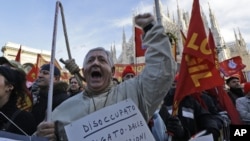The European Central Bank says the economic fortunes of the 17-nation euro currency bloc are likely to continue to decline next year and not advance again until late in 2013 and into 2014.
Bank president Mario Draghi gave his assessment of the eurozone economy Thursday after the central bank kept its benchmark interest rate at a record low of three-quarters of a percent.
"The economic weakness in the euro area is expected to extend into next year...," he said. "Later in 2013, economic activity should gradually recover, as global demand strengthens and our accommodative monetary policy stance and significantly improved financial market confidence work their way through to the economy."
The central bank said the eurozone economy is likely to contract about one-half of one percent this year, and possibly another three-tenths of a percent in 2013, before returning to growth of about 1.2 percent in 2014.
The eurozone has struggled to boost its economy in the wake of the three-year governmental debt crisis. Unemployment has risen to 11.7 percent throughout the region, the highest level since the currency bloc was formed in 1999.
Debt-ridden Greece reported that its jobless rate hit 26 percent in September, more than seven percentage points higher than a year ago.
Great Britain is not part of the eurozone, but it also is facing a weak economy. Its central bank, the Bank of England, on Thursday also left its key lending rate unchanged -- at one-half of one percent.
Bank president Mario Draghi gave his assessment of the eurozone economy Thursday after the central bank kept its benchmark interest rate at a record low of three-quarters of a percent.
"The economic weakness in the euro area is expected to extend into next year...," he said. "Later in 2013, economic activity should gradually recover, as global demand strengthens and our accommodative monetary policy stance and significantly improved financial market confidence work their way through to the economy."
The central bank said the eurozone economy is likely to contract about one-half of one percent this year, and possibly another three-tenths of a percent in 2013, before returning to growth of about 1.2 percent in 2014.
The eurozone has struggled to boost its economy in the wake of the three-year governmental debt crisis. Unemployment has risen to 11.7 percent throughout the region, the highest level since the currency bloc was formed in 1999.
Debt-ridden Greece reported that its jobless rate hit 26 percent in September, more than seven percentage points higher than a year ago.
Great Britain is not part of the eurozone, but it also is facing a weak economy. Its central bank, the Bank of England, on Thursday also left its key lending rate unchanged -- at one-half of one percent.





